The Magic Lamp Read online
THE MAGIC LAMP
Dreams of Our Age
Ben Okri
Start Reading
About this Book
About the Author
Table of Contents
www.apollo-classics.com
About The Magic Lamp
Twenty-five stories,
twenty-five paintings,
five years to write,
ten years to paint.
This is an extraordinary collaboration between artist and artist: the Booker Prize-winning writer Ben Okri and the painter Rosemary Clunie. Together they have created a world, and peopled it with dreams.
Twenty-five fairy tales for adults, these narratives are a response to our times, informed by our world but not limited by it, imaginative, enchanting, haunting – both prescient and prophetic. Twenty-five original paintings, beautiful, playful, intimate, dreamlike, these works pull you in to a land of colour and vision.
Who can say which came first, the word or image, when both grew together out of a long friendship and a creative symbiosis.
What if Calvino and Magritte had combined inspiration? What if we could see our world again with a child’s eyes?
What if there really is a magic lamp?
To my daughter, Mirabella Grace Okri.
May a wonderful light always guide you on the unfolding road.
Ben Okri
To my sister Margaret Wyatt and my brother Neil Clunie, with love and gratitude.
Rosemary Clunie
‘...and what is the use of a book,’ thought Alice, ‘without pictures or conversations?’
Alice’s Adventures in Wonderland, LEWIS CARROLL
Contents
Welcome Page
About The Magic Lamp
Dedication
Epigraph
Introduction
About the Paintings
Prologue
Birdtalk in a Tentative World
The Mystic Betrothal
A Vanishing World
Dimensions of a Storm
Artists of the Fading World
L’Époque Magique
City of Enigmas
Domain of Uruk
Gazing into a Dream
From the Magic Lamp
Things Not There
Return to the City of Dreams
Life is a Street Corner
The Blue Crusade
Poet by the Sea
The Rose and the Vine
The Falcon Dreamer
The Stoic’s Season
The Spirit Lifts
Those Enchanted Songs
Walking the Fish
Under the Sign
The Star Tree
When We From an Angel Fell
Prophecy
Acknowledgements
About Ben Okri
About Rosemary Clunie
Also by Ben Okri
More from Apollo
About Apollo
Copyright
Introduction
Writing and painting come from the same place. But they have different axes. They come from the same dream and are soaked in the same atmosphere. Every line that wanders on a page, every word and colour, is saturated in the undercurrents of the world.
In this book the paintings came first. The stories came after each painting had been lived with for a long time. The stories do not illustrate the paintings. They reach to the world from which the paintings came, the under stream of our lives. There one dream shades into another in a vast sea of being that we all unknowingly share.
Paintings, like life, are a rich source of inspiration. But only those that give us access to aspects of ourselves that might not emerge otherwise. These are parallel glimpses into the underlying currents of our times.
The artist is a canvas through which the true colours of an age seep out. The writer is a page on which the secret history of the times is written. Sometimes this history is oblique. Sometimes it is like a fable. And sometimes a colour or a form reveals that which we would rather not name. But artist and writer alike are prisms of the eternal and the contingent, the infinite and the political, myth as it is interpreted and history as it is lived.
Out of the same tube, we are squeezed; with the same pen, we are written. We think we write but the universe writes through us the veiled allegories of our age. Everything here reveals everything else that was in the air and that becomes more visible everyday. It becomes more visible and sometimes more alarming. Other times it is rich with the ongoing potentialities of liberation.
It is not against the blank canvas that the painter paints; it is not against the empty page that the writer writes. The canvas is peopled with infinite forms, but the painter chooses the true tangent between their own inner drama and the times in which they find themselves. The blank page is peopled with infinite stories, but the writer unconsciously chooses the best angle between their own inner conundrums and the invisible pressure of the times. That is all we can do. We geometricize our individual worlds and the atmospheric conditions that some call politics, others call history, but which are really the constantly changing faces of an enigmatic reality.
Just as no one knows what the period of time they are living through will ultimately mean, so we have no way of telling what the paintings and narratives in this book will eventually reveal.
Time is a riddle which the writer and artist interpret in their dreams. And their dreams are coded versions of all our dreams, given the tinge and temper of our mood and our spirit.
The spirit reads time through art. The spirit drinks the timeless through art. In that sense, writing is painting in the spirit, and painting is writing in colours and forms. They both point to the same mysterious allegory that is our lives. Seen as a prism, one face of it is politics, another face might be poetry, a third face might be war, a fourth face might be love, a fifth face might be art. But essentially the prism is refracting the same single unknowable reality in which we have our being.
Wander round this book as through the world laid out in the prism of words and colours, secret forms and hidden narratives. If we are going to change the world, we need to understand how it is made, and what dreams find concrete form in the forms of our times. It is with dreams that realities are made. We ought to work on the world as it is and on the dreams that daily become concrete in the hard stone and flowers of our times.
These stories and paintings were created in a spirit of playfulness. They were also made in a spirit of dream. Sometimes we had no other intention than to listen. Other times we had no other intention than to dream.
The spirit of playfulness yields lovely inspirations and hillsides of red and yellow flowers. Playfulness is the dreamtime of the spirit. Light forms appear and dance across the stage. But behind them, sometimes faintly heard, mostly not heard at all, a somber music plays. It may be the music of mortality. It may be the music of transcendence.
Sometimes we are best when we play. Sometimes when we play mysterious things speak through us, like genies from a magic lamp.
Ben Okri
About the Paintings
These paintings were made by experimenting with colours and evanescent forms. The coloured textures came first, and suggested the forms and images. A narrative moment is crystallized into being from the inner world of the colours and their geometries.
All the paintings share the premise that we are an integral part of our landscape. The convention in painting has been to separate the two. But I believe things are interconnected, are linked, and interact with each other.
Rosemary Clunie
Prologue
I once found a lamp in a house I had just moved into. The lamp belonged to the old woman who formerly owned the house. She collected art objects from all over th
e world. After she died, her children left behind a lot of her possessions. I found the lamp with the sewing machine and the abstract paintings and bags of compost for the potted plants.
One evening, an artist friend and I talked about the mysterious source of paintings and stories. The lamp stood on the table in front of us. It reminded us of the famous lamp that had once sprouted a genie to the touch, a genie that performed all manner of magical operations.
Languidly, we wished that our lamp would perform a similar operation. Instead of a genie awoken from a millennial sleep we wanted the complete manifestation of paintings and stories, legends and poems. In short we asked for nothing less than the gift of perpetual inspiration. The idea was that we would conceive the wish for a tale, a painting, or a poem, and it would appear on the page or the canvas the following morning.
Lazily playing with this wish, we rubbed the lamp and went to bed. The next morning we saw the curious fulfilment of an idle fancy. First a painting appeared, and the morning after that the legend accompanying it wrote itself miraculously, in a clean handwritten script, on the pages of a black notebook.
We conceived the wish, played with the lamp, and at dawn the works appeared.
That is how the curious tales and images you have before you in this volume made their way into the world.
First their presence caused us alarm, then curiosity, then wonder, then finally a gratitude laced with a sense of vertigo. Had some genie really created these tales and images, and made them come alive at dawn? Or had we been our own unknowing amanuenses, working without knowing that we did?
At the beginning we accepted the gifts without question, submitting them to our daily sense of the marvellous. But then something peculiar caused us to doubt the beneficial nature of those gifts.
It is hard to write about it now without a sense of dread. I am writing with the double superstition that if I mention the terrible events the lamp gave rise to they will happen again. Suffice it to say that these events seemed too close to one another to be mere coincidence.
It was then I glimpsed the strict economy of the universe, that even inspiration comes at a secret and unforeseen cost.
These disasters made us resolve to be more sparing in the use of the lamp. But as the events grew more serious, extending the danger to friends and loved ones, we placed very strict limits on what we demanded of the lamp.
It is now locked away in a silver trunk in a secret place deep in the earth. Only in the most pressing necessity will it be used in the future.
The price paid for such inspiration alarmed us. To keep what is left of a normal life we have placed on the lamp a seal of silence. We hope its genie will enjoy the bounty of its solitude.
We trust therefore that you appreciate what these stories and paintings have cost us. We offer you this volume in the hope that the strange gifts of the magic lamp may delight you on the obscure paths of life.
May you never wish for that which only genies can fulfil. Their gifts are always ambiguous.
Birdtalk in a Tentative World
There are rumours that we are living in a tentative world. These rumours have been around for as long as the world has been round. But recently I started hearing the rumours in a new way.
Has the world changed or have I? Did the world change me, or did I change the world, with that new listening? These things are hard to determine. Some maintain that the world became what it did after the rumours.
I remember the morning it all changed. On that morning colours were singing in the light. All became clear. The greens and yellows and ochres were singing. I found myself listening. As I listened a friendly bluejay landed on a wooden post next to me.
‘All things have been talking to you from the beginning of time,’ it said, ‘and you’ve not been listening.’
All the colours were quivering around me.
‘You walk the face of the earth and do not notice that all things are dreams.’
From the earth a curious melody bloomed and turned into the form of trees.
‘Every song I sing is a form of praise, and out of the praise things are made.’
I seemed to be breathing not air but the pure substance of things, an undevouring fire.
‘What you call beauty is music in the soul.’
The more I breathed this fire, the more I felt the buildings around me hover. The world seemed in suspension in the fine spaces of the light.
‘Everything wants to be raised, you know.’
It was a thought that passed through me with a mild seismic spasm. The greens and the ochres were silent. In their place the lilac sky was intoning a majestic syllable and it spread over the world an enveloping summer enchantment.
‘Even the colours change with your mood, it seems.’
I stood there, among the colours, as on a lost day of childhood when a wish that you had formed had acquired substance and appeared before you like a genie. I breathed gently and tried to keep the world from turning. I had to keep it still. The stillness was all.
‘Did you know there are gaps in time that Heaven pours through?’
I shook my head.
‘You are in one such gap now, my friend.’
With this the birdtalk came to an end. I stood there in the silence of the field. The bluejay craned its head towards me. I looked around. Had I been listening to the bird, or had the bird been listening to me, in this tentative world?
The Mystic Betrothal
They stand apart, waiting for the moment that will bring them together. He holds the last symbol of life. She stands protected against all that fire. They are the mysterious hope of the kingdom. It would take all the secret forces of the land to bring them together. It would take an act of magic beyond the madness of the times. They stand at the end of a secret tradition that has passed through Atlantis and the pyramids. The lost word quivers around them in the enchanted air. The world waits with the last dying flower for the difficult miracle.
Outside this ring of trees, they say the world is burning. In the evening, through the hyacinth leaves, we sometimes glimpse people falling from the high towers. They fall without a sound. Then, much later, across the waters, we hear the delayed cry of that fall.
Rumours come to us from beyond. Rumours of a church in green flames, of wailing sirens beyond the tower blocks, of frozen music in desolate houses. Rumours of marauding bands of foxes who eat from the tables of abandoned homesteads, and who watch televisions that are never switched off.
Rats the size of dogs live in decaying maisonettes. The rats have eaten the foundations of the palaces. They can be seen in the square where the queen once waved to her sleepless subjects.
There is a steady murmur in the land beyond. Somewhere across the wasteland a lost symphony howls from a radio in a garbage can. A digital electronic heat has decomposed the colour of the clouds. The gibbering of the mad, the anxious and the disillusioned can be heard across the river.
Even atheists have lost their faith. Money brands the palms of those who hold it. Gold has lost its meaning. In the dry broadcasts of that electronic dawn we learn that the famous have lost their reason, the rich have lost their minds, and the beautiful have lost their glamour. The Government rules with the claws of crows. Only the indifferent get elected.
But you are here now in this ring of trees. The turtle dove murmurs yellow melodies. Flute music waters the lavender and honeysuckle. The houses here are all symbols with spacious rooms in which the air is pure. The blue clouds create a reality that is like a dream. In this garden they stand and they wait. He holds the ankh like a weapon against fire. Her bridal dress is a panacea against all corruption. Her arms folded in benediction. Time is magical here.
The alchemical ceremony takes place under the aegis of the unseen masters. There are no witnesses, except our hopes. It is a mystic betrothal in an age of madness. The flower blooms again as the syllables renew the air. Something has changed in the heart of the fallen kingdom. The water tastes new in the river
s.
A Vanishing World
It is always there, round the turning. It is always there, round the turning of the trees. Round the turning of the trees, it is always there just vanishing.
There is blood in our eyes and rape in the scent of history. Women are bruised at night across the cities and are abducted in the dry North. Flowers are starved of pollen. There are oil spills in the guts of Dolphins and the fragrance of melted icecaps above the masts of polar ships.
But it is just beyond the turning. Beyond the turning of the page. Maybe the turning of the age. We who are here can’t see it.
Then there comes one riding a horse with a golden saddle. His eyes are blue from a long Atlantean journey. In his saddle-pack a host of stories like genies from lost temples and forgotten pyramids. He comes while our world is on its last page.
The sycamore trees and the lavender bushes and the bluebells sprinkled in the tall grass don’t notice it. Don’t notice the last page of our age. Nor does the mottled blue of the sky. Nor the yellow radiance of the sun in the body of the clouds. They don’t notice it.
Just us who are here, breathing the electromagnetic glare, volcanic ash in our eyes. Our Vesuvius is not a rumble of earth and an embalming of cities. Our Vesuvius is in newsprint, in rumours and truth worse than rumours. In the dead eyes staring without wonder at the leaves.
But it is always there round the turning. Round the turning whence he comes, leaning forward on his horse like a weary traveller from out of an old leather-bound tale. His robe yellow and brown, dust in his hair. Though we don’t know it, for the air behind him is clearer than the air before him – he brings something we had dimly heard of in tales we learnt as children, when the waters were still innocent.

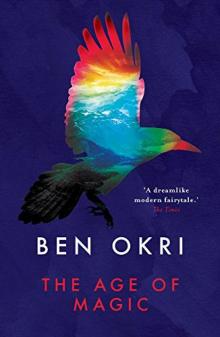 The Age of Magic
The Age of Magic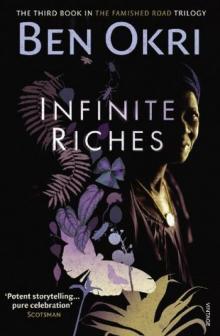 Infinite Riches
Infinite Riches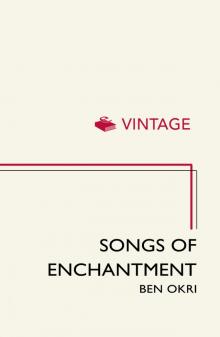 Songs of Enchantment
Songs of Enchantment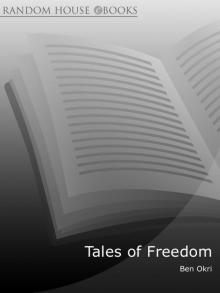 Tales of Freedom
Tales of Freedom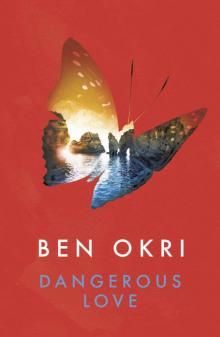 Dangerous Love
Dangerous Love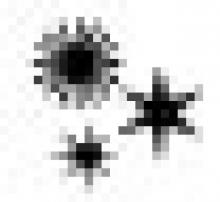 Starbook
Starbook The Famished Road
The Famished Road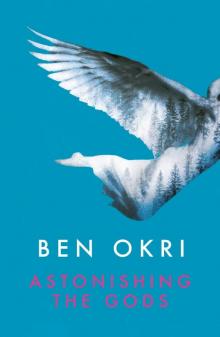 Astonishing the Gods
Astonishing the Gods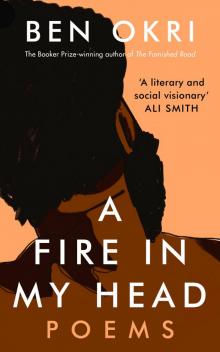 A Fire in My Head
A Fire in My Head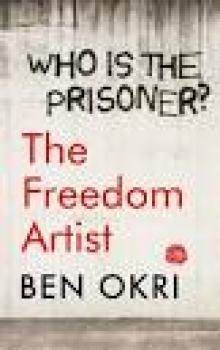 The Freedom Artist
The Freedom Artist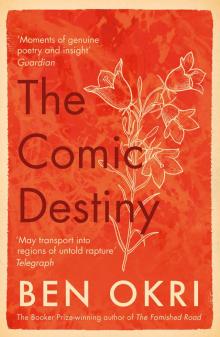 The Comic Destiny
The Comic Destiny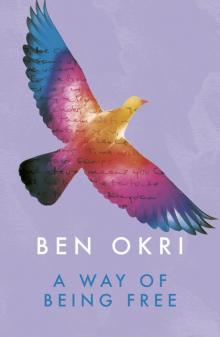 A Way of Being Free
A Way of Being Free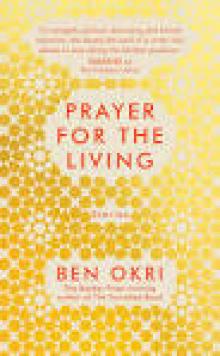 Prayer for the Living
Prayer for the Living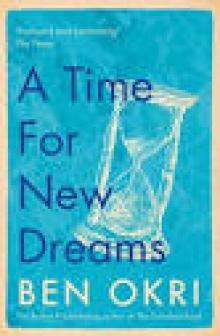 A Time for New Dreams
A Time for New Dreams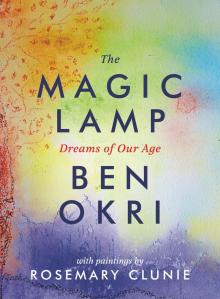 The Magic Lamp
The Magic Lamp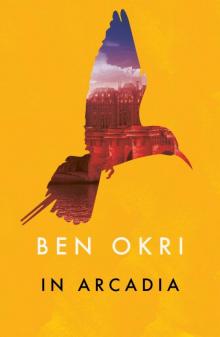 In Arcadia
In Arcadia